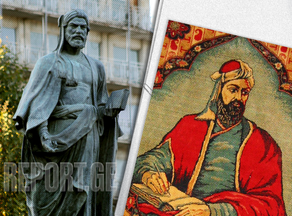
Don't lag behind, a stupid man is not preparing anything good for you – the author of these words, Azerbaijani classicist and humanist, one of the prominent representatives of literature, Nizam ad-Dīn Abū Muḥammad Ilyās ibn-Yūsuf ibn-Zakkī, Nizami Ganjavi was born in Ganja, where he spent almost his entire life.
The Persian poetry in the 12th century was written mainly for kings, but the words above clearly show that Nizami Ganjavi did not choose the mode of praising others. Moreover, he maintained creative freedom until his death.
Nizami Ganjavi's creations showed a high resonance in Eastern literature. Admired by his poems, tens of compositions with the same title were created.
Ganjavi authored a collection of lyrics (Divan) and 'Khamsa' (The Five): 'The Treasury or Storehouse of Mysteries' (1179), 'Khosrow and Shirin' (1181), 'Layla and Majnun' (1188), 'The Seven Beauties' (1197) and Eskandar-Nâmeh (about 1200), which, in turn, is divided into two parts: "Sharaf Nameh" and "Iqbal Nameh."
Nizami Ganjavi's characters are diverse: starting with well-known Sasanian shahs (Khosrow Anushirvan, Khosrow Parviz, Bahram Gur, and others) ended with ordinary people: lapicide Farhad, artist Shapur, shepherd, and others. The poet aims to express human feelings, searches for ways for moral transformation, and aspires to improve a person's role.
The Treasury or Storehouse of Mysteries includes 20 didactic conversations with no links among them. Thus, conditionally, we can say this composition is a poem. It aims to express the author's philosophical and religious views in a fictional form. The preface includes Nizami Ganjavi's poetic viewpoints.
The following three poems created an entire epoch for the development of the epic-romantic area in Eastern literature.
'Khosrow and Shirin' is a real piece of work without fairy-tales and fantastic elements, and it represents a rare exception in eastern literature. In this work, the author aims to assure the reader that love has a power that makes people better. The author succeeds with his fictional excellence and credibility. As he confronts Khosrow and Farhad – Shah and worker – the author highlights their equality in rights, natural feelings like love.
'The Seven Beauties' talk about Mahram Gur's life. Nizami Ganjavi preaches an idea of a fair Shah in this piece of work.
As several writers say, 'Layla and Majnun' - the brilliant work by Nizami Ganjavi, resembles the poem "The Knight in the Panther's Skin" by Shota Rustaveli in its plot and content. At first sight, the story is simple and is about a couple in love. The characters are semi-fictional, semi-historical personalities and, in their actions, are like the characters of other romantic poems. Nizami Ganjavi created his poem by modifying the Arab-Berber legend. He transferred the development of the plot to the urban environment and supplemented the narrative with descriptions of nature. The poem was published in different countries in diverse versions of the text.
Eskandar-Nâmeh occupies a special place in Nizami Ganjavi's works. It is based on Persian and Arabic chronicles. According to Christian and Jewish sources, Eskander (Alexander the Great) is an ideal king searching for justice and truth, explaining the essence of human beings' existence. Nizami Ganjavi was the first eastern poet who praised Tbilisi's beautiful nature and friendship of Caucasian nations that jointly confronted Alexander the Great to invade Transcaucasia. The poet created well-known faces of characters: Azerbaijani Queen Nushabe, Georgian King, and Commander Melik Daval, who got married.
Literary scholars think that Nizami Ganjavi was the first from the Islamic world who honorably responded to ancient literary masterpieces, while Shota Rustaveli's 'The Knight in Panther's Skin' is considered such a great book in the Christian world.
As for Ganjavi's private life, information is scarce. Raisa is known as his mother's name, while his father's name, Yusuf is once mentioned in his poetry, but no other information is available. Nizami was orphaned at a young age, and he lived with his uncle. Nizami got married three times. His first wife, Afak, was a Kipchak slave woman who was sent to him by Fakhr al-Din Bahramshah, the ruler of Darband. She became his first and most beloved wife and gave birth to the only son Mohammad> Afak died when Nizami ended Khosrow and Shirin. Mohammad was seven at that time.
Notably, Nizami's other wives also died young. Their death coincided with completing a new epic poem by Nizami, and the poet said: "God, why should I sacrifice my wife for each mathnawi!"
Legend says that Nizami was highly valued during his lifetime, although his works' exact dates have not been preserved. Moreover, the dates of his death and birth are controversial. Medieval biographers indicate different data, differing by about thirty-seven years. Nizami's date of birth is recorded in biographies as 1141 and his death as 1209.
The Georgian readers know the work of the poet, who was born in a neighboring country. Almost all of his works are available in Georgian.
One of the streets of the Georgian capital, in Old Tbilisi, is named after Nizami Ganjavi, while 2021 is declared the year of Nizami in Azerbaijan. Besides, at the beginning of this year, the Georgian jewelry company "Zarapxana" made a tabletop figurine of Nizami Ganjavi.



























